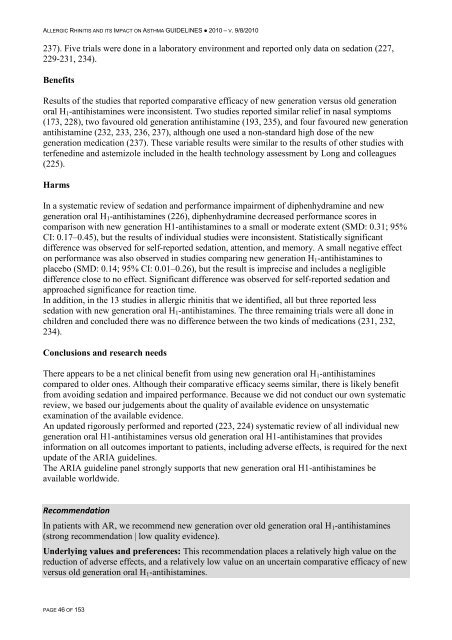Allergic Rhinitis and its Impact on Asthma - ARIA
Allergic Rhinitis and its Impact on Asthma - ARIA
Allergic Rhinitis and its Impact on Asthma - ARIA
You also want an ePaper? Increase the reach of your titles
YUMPU automatically turns print PDFs into web optimized ePapers that Google loves.
ALLERGIC RHINITIS AND ITS IMPACT ON ASTHMA GUIDELINES ● 2010 – V. 9/8/2010<br />
237). Five trials were d<strong>on</strong>e in a laboratory envir<strong>on</strong>ment <str<strong>on</strong>g>and</str<strong>on</strong>g> reported <strong>on</strong>ly data <strong>on</strong> sedati<strong>on</strong> (227,<br />
229-231, 234).<br />
Benef<str<strong>on</strong>g>its</str<strong>on</strong>g><br />
Results of the studies that reported comparative efficacy of new generati<strong>on</strong> versus old generati<strong>on</strong><br />
oral H1-antihistamines were inc<strong>on</strong>sistent. Two studies reported similar relief in nasal symptoms<br />
(173, 228), two favoured old generati<strong>on</strong> antihistamine (193, 235), <str<strong>on</strong>g>and</str<strong>on</strong>g> four favoured new generati<strong>on</strong><br />
antihistamine (232, 233, 236, 237), although <strong>on</strong>e used a n<strong>on</strong>-st<str<strong>on</strong>g>and</str<strong>on</strong>g>ard high dose of the new<br />
generati<strong>on</strong> medicati<strong>on</strong> (237). These variable results were similar to the results of other studies with<br />
terfenedine <str<strong>on</strong>g>and</str<strong>on</strong>g> astemizole included in the health technology assessment by L<strong>on</strong>g <str<strong>on</strong>g>and</str<strong>on</strong>g> colleagues<br />
(225).<br />
Harms<br />
In a systematic review of sedati<strong>on</strong> <str<strong>on</strong>g>and</str<strong>on</strong>g> performance impairment of diphenhydramine <str<strong>on</strong>g>and</str<strong>on</strong>g> new<br />
generati<strong>on</strong> oral H1-antihistamines (226), diphenhydramine decreased performance scores in<br />
comparis<strong>on</strong> with new generati<strong>on</strong> H1-antihistamines to a small or moderate extent (SMD: 0.31; 95%<br />
CI: 0.17–0.45), but the results of individual studies were inc<strong>on</strong>sistent. Statistically significant<br />
difference was observed for self-reported sedati<strong>on</strong>, attenti<strong>on</strong>, <str<strong>on</strong>g>and</str<strong>on</strong>g> memory. A small negative effect<br />
<strong>on</strong> performance was also observed in studies comparing new generati<strong>on</strong> H1-antihistamines to<br />
placebo (SMD: 0.14; 95% CI: 0.01–0.26), but the result is imprecise <str<strong>on</strong>g>and</str<strong>on</strong>g> includes a negligible<br />
difference close to no effect. Significant difference was observed for self-reported sedati<strong>on</strong> <str<strong>on</strong>g>and</str<strong>on</strong>g><br />
approached significance for reacti<strong>on</strong> time.<br />
In additi<strong>on</strong>, in the 13 studies in allergic rhinitis that we identified, all but three reported less<br />
sedati<strong>on</strong> with new generati<strong>on</strong> oral H1-antihistamines. The three remaining trials were all d<strong>on</strong>e in<br />
children <str<strong>on</strong>g>and</str<strong>on</strong>g> c<strong>on</strong>cluded there was no difference between the two kinds of medicati<strong>on</strong>s (231, 232,<br />
234).<br />
C<strong>on</strong>clusi<strong>on</strong>s <str<strong>on</strong>g>and</str<strong>on</strong>g> research needs<br />
There appears to be a net clinical benefit from using new generati<strong>on</strong> oral H1-antihistamines<br />
compared to older <strong>on</strong>es. Although their comparative efficacy seems similar, there is likely benefit<br />
from avoiding sedati<strong>on</strong> <str<strong>on</strong>g>and</str<strong>on</strong>g> impaired performance. Because we did not c<strong>on</strong>duct our own systematic<br />
review, we based our judgements about the quality of available evidence <strong>on</strong> unsystematic<br />
examinati<strong>on</strong> of the available evidence.<br />
An updated rigorously performed <str<strong>on</strong>g>and</str<strong>on</strong>g> reported (223, 224) systematic review of all individual new<br />
generati<strong>on</strong> oral H1-antihistamines versus old generati<strong>on</strong> oral H1-antihistamines that provides<br />
informati<strong>on</strong> <strong>on</strong> all outcomes important to patients, including adverse effects, is required for the next<br />
update of the <strong>ARIA</strong> guidelines.<br />
The <strong>ARIA</strong> guideline panel str<strong>on</strong>gly supports that new generati<strong>on</strong> oral H1-antihistamines be<br />
available worldwide.<br />
Recommendati<strong>on</strong><br />
In patients with AR, we recommend new generati<strong>on</strong> over old generati<strong>on</strong> oral H1-antihistamines<br />
(str<strong>on</strong>g recommendati<strong>on</strong> | low quality evidence).<br />
Underlying values <str<strong>on</strong>g>and</str<strong>on</strong>g> preferences: This recommendati<strong>on</strong> places a relatively high value <strong>on</strong> the<br />
reducti<strong>on</strong> of adverse effects, <str<strong>on</strong>g>and</str<strong>on</strong>g> a relatively low value <strong>on</strong> an uncertain comparative efficacy of new<br />
versus old generati<strong>on</strong> oral H1-antihistamines.<br />
PAGE 46 OF 153


